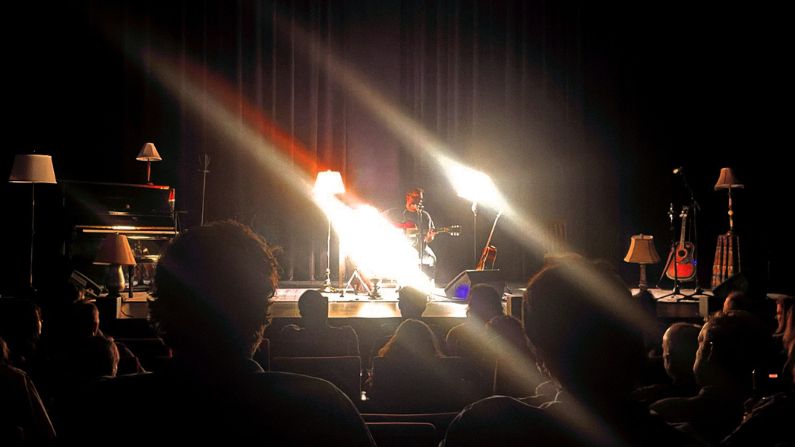I took my seat at the Center for the Arts, hoping to relax into a show by an artist I fell in love with as soon as I heard his album Heartbreaker in 2000. Dressed in buffalo plaid, and with a set adorned with a menagerie of table lamps, the infamous singer-songwriter Ryan Adams initially seemed in his element for his July 15 solo show.
Adams opened his set with his hit “Oh My Sweet Carolina” seated on the stage in an armchair, playing acoustic guitar.
After the first song, Adams let everyone know how uncomfortable he was — because of the altitude. He said his voice was off. His ears were clogged. His Ménière’s disease, a condition that affects balance and sound, made everything more complicated here in the “high desert and low valleys.”
Sober now for three years — a fact he touted and the audience celebrated — Adams’ performance soon made me question whether that was accurate.
For an artist who has faced public backlash for his on and off-stage behavior, Adams seemed to make no effort to ingratiate himself with the audience, many of whom paid $100 a seat for the three-hour set. He threw shade at anyone he could – his ex-wife singer-songwriter Mandy Moore, Wilco frontman Jeff Tweedy and even audience members.
Despite the show selling out within hours of being announced last spring, his visit was not without controversy even before he took the stage. The local nonprofit Community Safety Network, which helps victims of abuse and domestic violence, wrote a “guest shot” op-ed in the News&Guide admonishing his treatment of women — and his subsequent mediocre apology. The seven-time GRAMMY nominee fell from grace in 2019 when a New York Times investigation found “a pattern of manipulative behavior in which Adams dangled career opportunities while simultaneously pursuing female artists for sex.”
Adams tried to defend his behavior on stage, referring to his so-called Southern way. He referenced an anecdote about his ex-wife’s hurtful behavior to gain our sympathy but those defenses became hard to reconcile as the evening progressed. Self-deprecating between songs, he complained about the treatment he’s received over the past five years since his mistreatment of others made headlines.
Soon after he broke the ice with his first tirade, he ranted about our collective addiction to our phones. Frustrated with the occasional phone snapshot from the crowd, Adams probably should have gotten on the same page with his stagehand who, before the show, made clear that photography was allowed but only without the flash, as the light was disabling for Adams due to his Ménière’s.
Perhaps most egregious though, Adams harassed a couple seated in the stage right box seats, mostly picking on the woman who he said looked “bored to death.”
Could there have been a more misogynist or exhausting critique of a woman’s facial expression? It felt like the equivalent of a man telling a woman, “You’d be prettier if you smiled.” If he wanted us to smile, this harassment was sure to do the opposite.
After being berated by Adams at least once more, the smile-less woman and her companion eventually left.
From Adams’ perspective, the show was explicitly curated and deserved the utmost attention. This for Adams implied the audience should not take any bathroom breaks in the intermission-free performance, despite his initial guidance that coming and going was to be expected for his three-hour show.
I had mixed feelings about being there — knowing full well his history. But I do appreciate his songwriting and a friend offered me a ticket last minute and, well, my curiosity got the best of me.
Adams’ obvious skill was on full display during the improvised song he crafted “She’s a Boat” which drew inspiration from audience banter. It was a love song, of sorts, taken from the mishearing — or mondegreen — of a response to whether an audience member was “hot and single” and her friend responding “she’s both.” Thus leading to the song “She’s a Boat.” It was the only moment of levity that night.
Adams closed his set with his classic “Come Pick Me Up.” The first minute of the song felt like a reprieve — something familiar and comforting, like we were going to finally, after three hours, get what we all fell for with Adams decades ago.
But we were tricked. Adams interrupted his performance mid-song — first saying he wasn’t singing well. Then finding another excuse for his behavior, blaming audience members for filming him and making him uncomfortable.
Adams put his guitar down and walked off stage, mid-song.
It was clear the night was over. The house lights came on. Partly confused and partly relieved for the end, the audience applauded. The then half-full house stumbled out. It was past time to put the night — and our Ryan Adams fandom — to rest.





